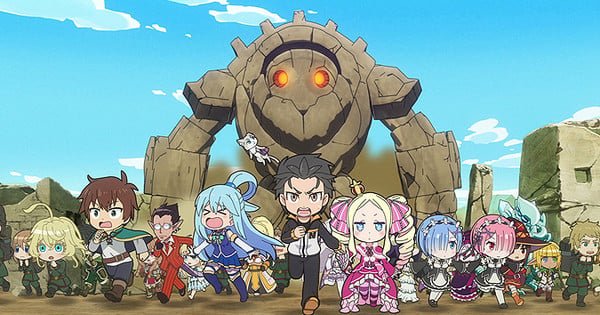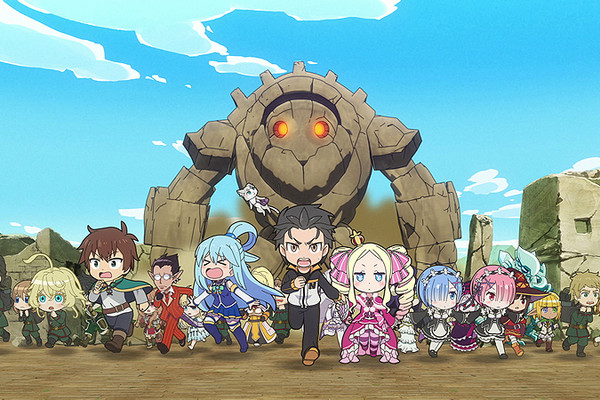
The dictionary. It’s the instrument we use after we wish to show {that a} phrase is just not actual and when somebody makes use of a phrase incorrectly. Literal. And I imply “literal” as literal and never hyperbolic. And now, anime followers within the English-speaking world can declare that isekai is now a phrase. Nevertheless it’s a bit of extra difficult than that.

© One other World Quartet the Film/KADOKAWA
As introduced on the Oxford English Dictionaries (OEDs) X (previously Tweet) account And Homepage, the dictionary has now included a slew of Japanese loanwords of their most up-to-date replace. Among the many phrases are ‘tonkotsu’, ‘donburi’, ‘okonomiyaki’, ‘onigiri’, ‘tokusatsu’ and for us anime followers ‘isekai’. Nonetheless, this isn’t the primary time that Japanese loanwords have entered the English lexicon. Examples from the previous embody phrases like ‘ramen’, ‘anime’ and ‘manga’.
🇯🇵 Within the newest OED replace, a brand new batch of phrases of Japanese origin have been added to the dictionary, together with ‘kintsugi’.
Learn the definition under and uncover extra on this article by OED World English Editor Danica Salazar: https://t.co/T994B6O1KT pic.twitter.com/EW9VUsewu1
— The OED (@OED) March 28, 2024
So, how does the OED outline “isekai”? In keeping with the dictionaries Homepagethe phrase is outlined as:
A Japanese style of science or fantasy fiction that includes a principal character who’s transported to or reincarnated in one other, unusual or unknown world. Additionally: an anime, manga, online game, and so forth., on this style. Typically as a modifier.
Translators might dispute the definition, however it is a concise and acceptable definition of the phrase. However this raises an fascinating query: how are phrases truly added to the English language after which to the dictionary?
And now one thing about phrases
The primary is far simpler to reply. The English language introduces new phrases by way of use, particularly by way of widespread use. A great instance of that is slang phrases. Take the phrase ‘rizz’ for instance. A shortening of the phrase “charisma”, “rizz”, got here into widespread use and adoption within the late 2010s and early 2020s. An identical argument will be made with ‘anime’. Though the phrase was in use earlier than the 2000s, it didn’t develop into broadly accepted till across the 2000s – and lengthy earlier than that the medium was sometimes called “Japanimation”. And it does not actually matter whether or not a phrase seems in a dictionary or is just not thought-about a phrase.
That is mostly acknowledged with the phrase ‘is just not’. Typically used within the sense of ‘am not’ or ‘is just not’, ‘not’ is ridiculed by a sure sect. But, in line with In keeping with Merriam-Websters Dictionary, the phrase has been used since 1749. So take that with no consideration: individuals who say it is not a phrase are usually not a phrase.
So if a phrase is broadly used and adopted, does it find yourself within the dictionary? Effectively, this is not precisely the case both. In a March 2017 Vox YouTube interview with Merriam-Webster’s Dictionary affiliate editor Kory Stamper, Stamper notes Merriam-Webster’s contains phrases in the event that they meet three standards: 1) Widespread use, 2) Shelf life, and three) Significant use. So if we apply the identical standards to ‘isekai’, the phrase is broadly used (not less than amongst anime and manga followers) and has significant utilization. As for shelf life, solely time will inform. However with the present recognition of isekai tales, we in all probability will not see it occur once more for some time, particularly if we flip it into the verb “isekaied.”
There may be one other facet of dictionary use that emerges with the addition of “isekai” to the dictionary OED. Will we use a dictionary to dictate how phrases must be used, or can we use dictionaries to assist us perceive how phrases are used? In additional technical phrases, is that what we would like dictionaries to be? prescriptive or descriptive? The identical Vox interview talked about above elaborates on this, and for essentially the most half, Stamper notes what number of trendy dictionaries are descriptive of their utilization.
There was truly fairly an issue with the Webster’s third new worldwide because it shifted from a extra prescriptive type to a descriptive type. This precipitated a rift on the level the place the American Heritage Dictionary was created. However even now the American Heritage Dictionary leans on descriptive utilization whereas nonetheless retaining its prescriptive roots. So on this sentence the phrase ‘isekai’ is included within the OED It’s not the best way the dictionary can dictate how the phrase must be used, however by noting how it’s used.
With “isekai” now within the OED, there isn’t any telling what different anime and manga phrases will enter the English lexicon. For me, I hope that the dictionary entry for the phrase “identify” will embody how this time period (ネーム) is used within the manga publishing trade (the tough miniature draft or storyboard of a manga). However solely time will inform.
Sources: Oxford English Dictionary (hyperlink 2), Oxford English Dictionary X/Twitter invoice, The guard, Merriam-Webster’s DictionaryVox’s YouTube channel



